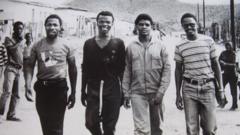Three decades post-apartheid, South Africa's government is scrutinized for its handling of unresolved crimes from the past, as an inquiry emerges from a lawsuit pressuring accountability for victims of political violence.
South Africa Launches Inquiry into Unresolved Apartheid Crimes

South Africa Launches Inquiry into Unresolved Apartheid Crimes
President Cyril Ramaphosa initiates a judicial inquiry aimed at addressing alleged political interference in the prosecution of crimes committed during the apartheid era.
South African President Cyril Ramaphosa has placed a spotlight on past injustices by announcing a judicial inquiry into allegations of political meddling that hampered prosecutions tied to apartheid-era crimes. This move comes 30 years after the dismantling of apartheid and follows legal action by a coalition of survivors and victims' families, who contend that the government has failed to deliver justice for grievous wrongs committed during that time.
The inquiry is rooted in the findings of the Truth and Reconciliation Commission (TRC), established in 1996, which documented numerous egregious acts including murder and torture, but only a small fraction of these cases have proceeded to legal trials. In Ramaphosa's statement regarding the inquiry, he emphasized the need to uncover the truth and bring resolutions to this long-standing matter.
The decision to pursue an inquiry results from settlement negotiations in a lawsuit filed in high court by 25 families and survivors seeking around $9 million in damages. They argue that successive governments have neglected to adequately investigate the grave crimes perpetrated by security forces during apartheid.
Among the plaintiffs is the son of Fort Calata, a member of the Cradock Four, who was killed in 1985 alongside three other anti-apartheid activists, a crime that provoked national outrage. While six former police officers admitted their roles in the killings to the TRC and were denied amnesty, none have faced legal repercussions and all have since passed away.
Critics have long speculated that the African National Congress (ANC), which has led the post-apartheid government, made a clandestine agreement with the remnants of the old regime to impede prosecutions and accountability. The ANC has denied these allegations. On Wednesday, the presidential office recognized that "claims of improper influence relating to the investigations and prosecutions of apartheid-era crimes have lingered under previous administrations."
Details on who will lead the inquiry and the timeline for its proceedings will be disclosed soon.






















